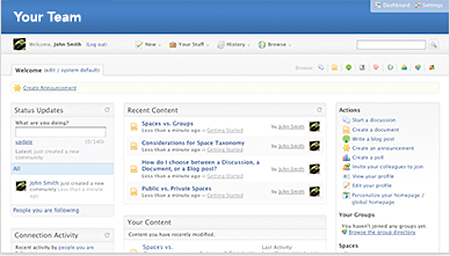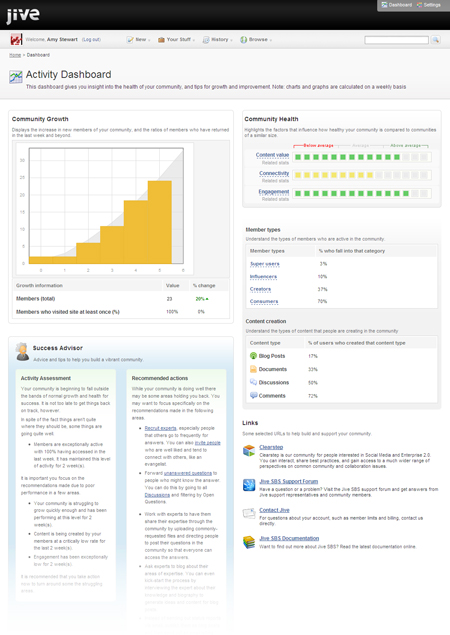Jive Introduce 'Software as a Service' Social Business Express

 Jive Software are launching a free for 90 days cloud version of their 'Social Business Software' (SBS) today - a lighter weight hosted solution for those who are grappling with internal infrastructure and resources challenges but need to get up and running with a collaboration environment.
Jive Software are launching a free for 90 days cloud version of their 'Social Business Software' (SBS) today - a lighter weight hosted solution for those who are grappling with internal infrastructure and resources challenges but need to get up and running with a collaboration environment.
The Express version of Jive SBS is stripped of modules, bridging, LDAP and configurable interface CSS and supports a maximum 1000 users at $3 per user per month, in comparison to the $59 per user per month for the full on premise user of SBS.
The SAS 70 certified offering runs on Amazon 'Elastic Compute Cloud' (EC2) in virtualized single tenant instances: all your data is separate from other Jive customer's Express environments. Interestingly, Jive considers multi tenant cloud offerings such as SalesForce to be too inflexible and risky.
It's possible to move all your data off the cloud (Jive hopes this initial experience will encourage upgrading to a full blown SBS, which is made easy by transferring all content created in Express to the on premise version for a seamless transition).
Wizard based setup and administration means an easy onramp. Actionable analytics are coupled with suggestions based on user activity and productised best practices, both aimed squarely at justifying use case as the system hopefully gains traction.
The 90 days free offer is aimed at enterprises with 500+ employees, and any users of each Express instance must all have the same email domain, limiting partner collaboration.
Jive's ClearStep support community (an instance of SBS) is available to users along with professional services/consulting help from their internal team to help you do things the Jive way and get maximum value out of the system.
IT Governance
This is a smart move by Jive to provide a fully operational proof of concept, albeit without some key ingredients for granular user control (integration with existing LDAP databases of employees for example).
The already crowded and confused market for collaboration software solutions, and the different use cases by business and particularly department could be further clouded by this additional option however.
Few people understand scaling of use case beyond their specific line of business needs at this point, while IT governance is in some cases a major roadblock to adoption justification.
The perception of a Jive collaboration environment being 'for the marketing people, not us' by wider users, to cite a random example, could silo this cloud product which lacks bridging to a broader community.
IT has the difficult task in many organizations of validating and approving moves to cloud solutions in many areas of the business based on risk vs reward often driven by economic constraints. Since IT are often in the unenviable position of being blamed if things go wrong and ignored when 'not installed by IT' systems take off, the single tenant secure approach is smart when such sensitive IP is involved. This appears low risk from an IT security perspective.
Suck it and See
The Jive marketing goal is presumably to get people using the system and see the value of it, and this 'suck it and see' experiential approach will undoubtedly be useful to those in large companies anxious to stop talking about collaboration software and start using it, to demonstrate value to their peers.
The risk vs reward for Jive is in these free, casual experiences not going off at half cock in organizations - being misused by ad hoc shadow IT breakouts for example, the front line of frequent grumpy exchanges between IT and line of business.
There are plenty of cloud solutions out there already being used in this way: Jive doesn't need to associate with this given their size.
Overall though this appears to be a useful training wheels exercise by Jive which lowers barrier to entry - prospects at an evaluation stage who can't download and install the SBS demo anywhere, and for whom the demo sand box is shallow can now set up a full experiential collaboration environment with Express and prove use case within their organization with actual project work flows.
